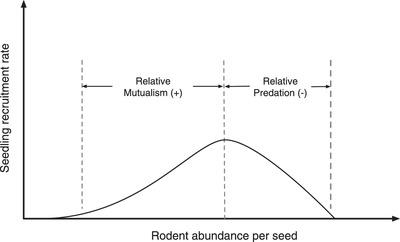当前位置:
X-MOL 学术
›
Integr. Zool.
›
论文详情
Our official English website, www.x-mol.net, welcomes your
feedback! (Note: you will need to create a separate account there.)
Rodent abundance triggered switch between the relative mutualism and predation in a rodent–seed system of the subtropical island forest
Integrative Zoology ( IF 3.5 ) Pub Date : 2020-07-13 , DOI: 10.1111/1749-4877.12475 Di ZENG 1 , Tinghao JIN 1 , Yuhao ZHAO 1 , Chuan YAN 2, 3 , Zhibin ZHANG 2 , Ping DING 1
Integrative Zoology ( IF 3.5 ) Pub Date : 2020-07-13 , DOI: 10.1111/1749-4877.12475 Di ZENG 1 , Tinghao JIN 1 , Yuhao ZHAO 1 , Chuan YAN 2, 3 , Zhibin ZHANG 2 , Ping DING 1
Affiliation

|
Density‐dependent non‐monotonic species interactions are important in maintaining ecosystem stability and function, but empirical evidences are still rare. Rodents, as both seed dispersers and seed predators, have dual effects on plant regeneration and may result in non‐monotonic rodent‐plant interactions. According to the non‐monotonic models, the relative positive or negative effects of rodents on seedling establishment can be measured based on the positive or negative association of seedling recruitment rate and rodent abundance. In this study, we investigated the fates of acorns of Quercus serrata by tracking tagged seeds on 21 fragmented subtropical islands in the Thousand Island Lake, China. We found that the proportion of germinated seeds of all released seeds showed a dome‐shaped association with rodent abundance per seed. The proportion of removed seeds and cached seeds showed a saturated‐ and a weak dome‐shaped association with rodent abundance per seed, respectively. Our results demonstrated a clear empirical evidence that rodent abundance per seed triggered a switch between the relative mutualism and predation in a rodent–seed system. Our study implied that the observed non‐monotonic interactions between plants and animals may play a significant role in maintaining biodiversity and ecosystem function. We appeal for more investigations of the complex non‐monotonic interactions in various ecosystems.
更新日期:2020-07-13











































 京公网安备 11010802027423号
京公网安备 11010802027423号